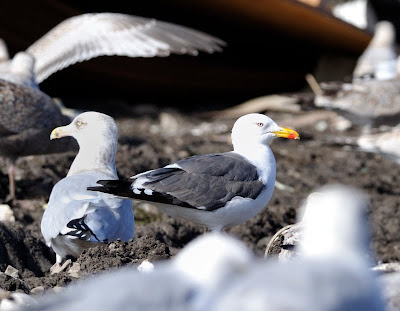I declare gull season officially open on the east shore of Lake Superior.
After a lot of travelling through the spring, summer and early fall I am looking forward to spending some time studying gulls locally this fall. My first trip to the local landfill was Saturday which quickly turned up and adult and juvenile Lesser Black-backed Gull which is still a relatively rare species here in the north country.
Adult Lesser Black-backed Gull
In fact this is the first time I have seen two Lesser Black-backs simultaneously in the Sault Area. I returned on Sunday and the juvenile bird was present for several hours allowing for decent pictures.
Juvenile Lesser Black-backed Gull
Although superficially similar to Herring Gull the juvenile Lesser Black-backed is quite different structurally with a slighter narrower bill, slimmer overall look and a elongated rear end with longer primary extension. It is also more black and white looking (white ground colour to head) and contrasting with Herring generally appearing browner. In flight the blackish primaries and coverts and lack of a pale inner primary window are obvious differentiating features. The rump is typically whiter appearing. The tertials are typically narrowly and evenly outlined with white while in the Herring Gull the tertials are usually more speckled at the tips. All these points can be seen in the following illustrative pictures.
Juvenile Lesser black-backed Gull
Juvenile American Herring Gull
After my "possible" European type Herring Gull experience last year I decided to keep a close eye out this year for similar birds. It didn't take long to find a couple interesting birds. The first bird I noted flying by as it had a very noticeable large white rump. Unfortunately I only got one not so great flight shot.
White-rumped Gull ( Juvenile Lesser Black-backed Gull)
Interesting. Quite dark primaries, secondaries and coverts with out much of a inner primary window. The rump is really sparsely marked with a narrow tail band. Kind of Lesser Black-backed like but has a brownish head and otherwise seems ok for a Herring.
Addendum-After looking at this pic a few times I am wondering if this isn't the/a juv Lesser Black-backed. KZ
Took a careful look at the above bird and compared it to shots of the juvenile Lesser Black-backed present at same time. I came to the conclusion that I could not definitively rule out that they are the same bird. Although the tail band on the above bird seems narrower with a whiter and less heavily marked rump this maybe just related to the fanning of the tail and the poor quality of the first picture. I couldn't find anything else that clearly differentiates these two birds.
Juvenile Lesser Black-backed Gull
The next bird was more Euro Herring Gull-like. Very checkered appearing with a narrow tail band. The bird caught my eye with its paler, contrasty, checkered look. Sure enough when it flew the tail band was considerably narrowed from the standard american Herring Gull.

"Checkered" American Herring Gull
It seems that this variation which I am going to call "Checkered" American Herring Gulls isn't all that uncommon. Whether it is just a plumage variation or a "population" from some specific site remains to be answered. I am going to see how many of these birds I can document this fall and will report back with more details later.
One last interesting observation from today. I watched a Ring-billed Gull chase a juvenile Herring Gull with a large morsel of some type of food item. It harassed it and actually jumped it forcing it to drop its goodies which the Ring-billed recovered and made off with. Most unusual as Ring-billeds in my experience almost never challenge the larger gulls and at the landfill hang out around the edges of the gull mass and out of the way of the usually far more aggressive Herrings.



Ring-billed Gull robbing Herring Gull
In the picture there doesn't seem to be much of a size difference between these two birds. Maybe a large male Ring-billed vs. a small female Herring?
I thought I might finish with a few pictures from my spring/summer travels. In April after viewing the Greater Sage Grouse lekking in Walden, Colorado I spent a couple hours photographing some stunning high breeding plumaged California Gulls. I thought this was likely L. c. albertaensis but after checking in Howell & Dunn it appears the Colorado sbsp is the nominate L.c.californicus.


Adult California Gulls-April, Walden, Colorado
In May I spent ten days cruising the Aleutians with a group of intrepid birders led by John Puschock (Zugunrhue Bird Tours). We started at Adak cruised out to Attu spent a week birding the island and then cruised back all the way to Dutch Harbor. Millions of seabirds including 1000s of Albatrosses of 3 species (including 12 Short-taileds of all ages), 14 sp. of alcid with 1000s of Whiskered Auklets, a scattering of Mottled Petrels, Fork-tailed Storm Petrels and rivers of Short-tailed Shearwaters made this the pelagic trip of a lifetime. We did see many Red-legged Kittiwakes, a single Slaty-backed Gull and numbers of the commoner gull species. There is no words to describe the thrill and excitement of this experience and I would highly recommend this trip to all.

Adult Glaucous-winged Gull at Attu

Adult Glaucous-winged Gull somewhere in the Aleutians

Aleutian Great Black-backed Gull

Aleutian Even Greater Brown-backed Gull
A few from various California ports of call.

Adult winter Heerman's Gull at Tijuana Slough NWR

Juvenile Western Gull at Mission Bay

Second winter western Gull at Mission Bay

Third winter Western Gull of San Diego
First winter Heerman's Gull of Half Moon Bay
One for the road:

Black-footed Albatross impersonating a juvenile Western Gull
Cheers
Kirk Zufelt
zufelt_k@shaw.ca

































